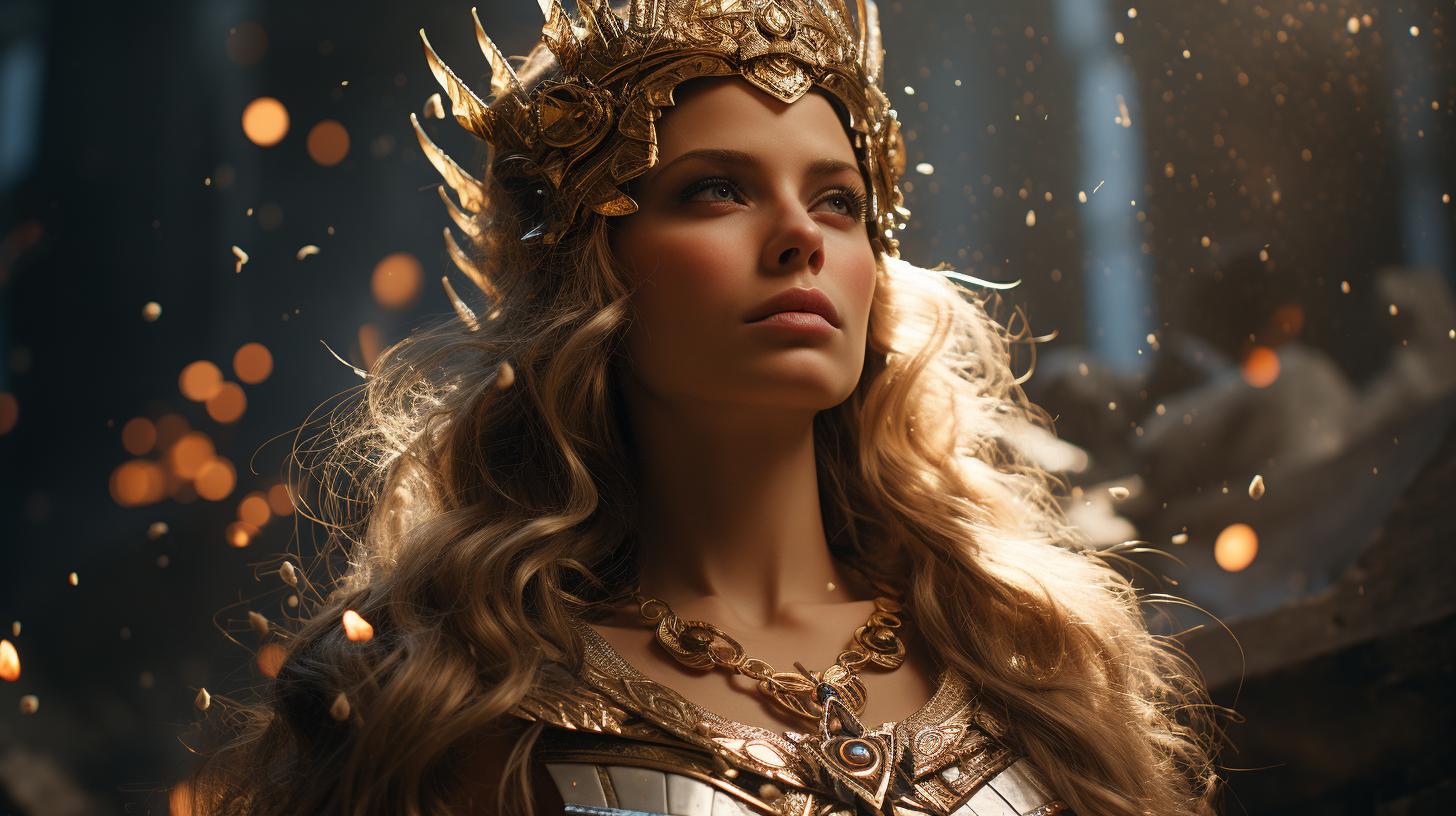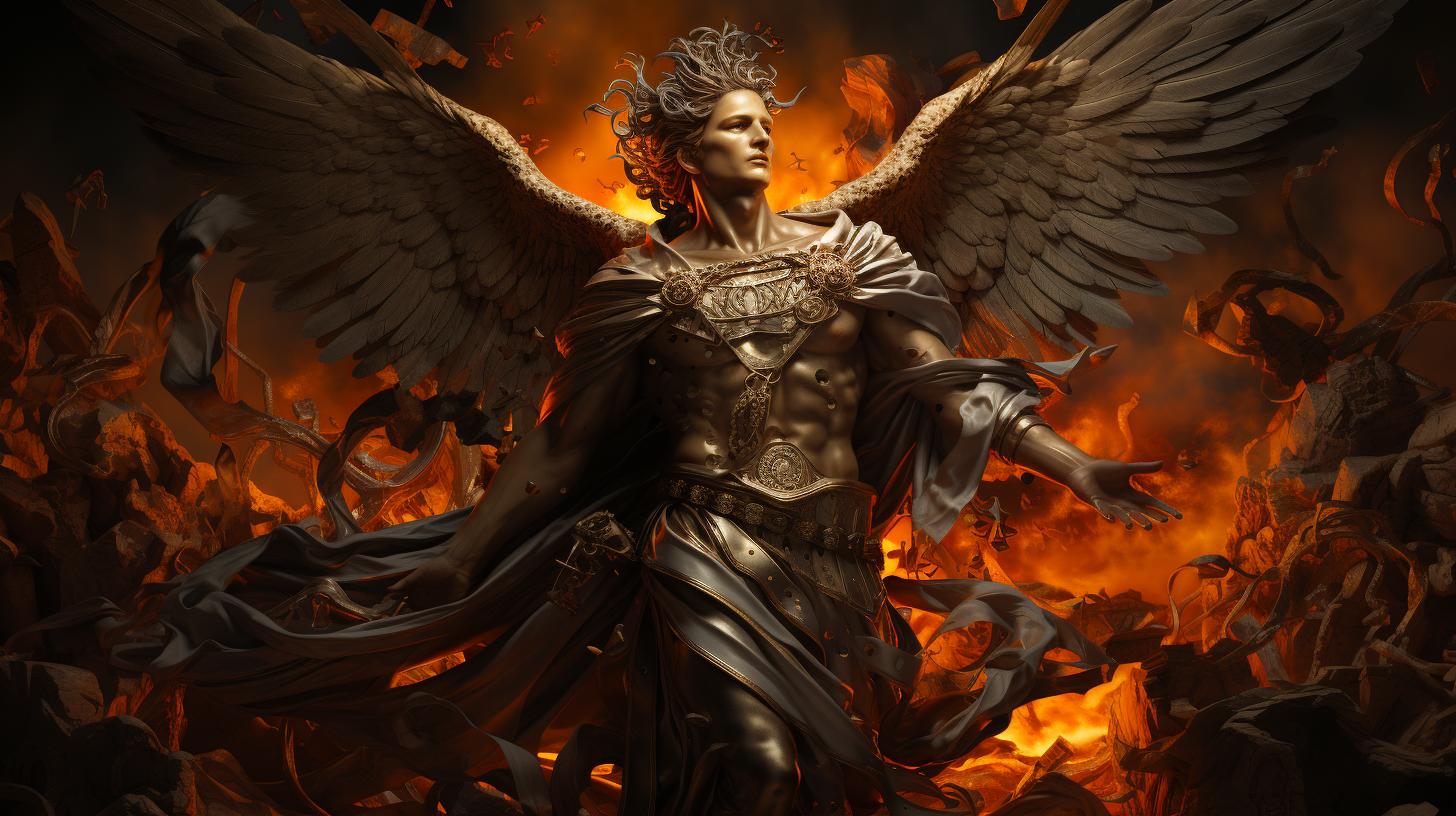Facts About the Greek Goddess Demeter: Unveiling Her Ancient Mythology

Demeter, the Greek goddess of harvest, fertility, and motherhood, holds a significant place in ancient mythology. As the daughter of Titans Rhea and Cronos, and sister to powerful deities like Zeus and Hades, Demeter’s story is intertwined with the abduction of her daughter Persephone and the resulting seasonal cycle.
Her divine influence also extends to agriculture, health, and healing. In this article, we explore the mythology surrounding Demeter, the Eleusinian Mysteries, her artistic depictions, and her connections to other Greek goddesses.
Join us on this fascinating journey into the world of Demeter.
The Mythology of Demeter
Demeter, the powerful Greek goddess associated with harvest and fertility, holds a significant place in ancient mythology. Let’s explore the fascinating origins and captivating stories surrounding this divine figure.
The Origins of Demeter
In Greek mythology, Demeter is believed to be the daughter of Titans Rhea and Cronos.
As part of the first generation of Olympian deities, she emerged from a rich tapestry of divine lineage. Her birth, like that of her siblings, was shrouded in the ancient battles of the Titans.
Demeter in Greek Mythology
Demeter’s prominence spans across various narratives. She is often recognized as the goddess of agriculture, responsible for the growth and abundance of crops. However, her influence extends far beyond the fields, encompassing other aspects such as health, fertility, and the sanctity of marriage.
Demeter’s Family: The Titans and Olympians
As the daughter of Rhea and Cronos, and the sister of deities like Hestia, Hera, Hades, Poseidon, and Zeus, Demeter’s familial connections intertwine with the intricate web of Greek mythology.
These relationships shaped her character and influenced her interactions with other gods and goddesses.
Join us as we venture deeper into Demeter’s sphere of influence, uncovering her roles as the goddess of agriculture, fertility, and motherhood.
Demeter’s Sphere of Influence
Demeter, the Greek goddess of agriculture and harvest, held a significant role in ancient mythology. Her sphere of influence encompassed various aspects of life, including fertility, motherhood, and health. Let’s explore each of these domains in detail:
Goddess of Agriculture and Harvest
Demeter was revered as the divine protector of agriculture and the harvest.
Farmers and peasants sought her blessings for bountiful crops and successful harvests. She was often depicted with sheaves of corn or wheat, symbolizing abundance and fertility. The well-being of the earth and its people relied heavily on Demeter’s favor, making her a central figure in the agricultural cycle.
Goddess of Fertility and Motherhood
Demeter’s role extended beyond the fields to encompass fertility and motherhood. She was deeply connected to the cycles of life and was invoked by women seeking blessings for conception, safe pregnancies, and healthy childbirth.
Many women saw her as a guardian and guide, ensuring the well-being of both mother and child. Demeter’s nurturing and protective nature made her a beacon of hope for those yearning for the joys of motherhood.
Goddess of Health and Healing
Demeter’s influence also encompassed health and healing. She was revered as a goddess who could restore vitality and ensure the well-being of individuals. Offerings and prayers were made to her in times of illness and disease, seeking her divine intervention for recovery and wellness.
As the goddess of health, Demeter provided solace and comfort to those in need, offering a glimmer of hope amidst life’s hardships.
The multifaceted influence of Demeter as the goddess of agriculture, fertility, motherhood, and health made her a powerful and revered deity in ancient Greek society.
Her connection to the natural world and human existence was deeply rooted and continues to resonate throughout history.
The Eleusinian Mysteries
The Eleusinian Mysteries were a series of ancient Greek religious rituals and initiations dedicated to the goddess Demeter. These mysteries held great importance in the religious and cultural life of ancient Greece.
They were celebrated in the city of Eleusis, located near Athens, and were open to both men and women of Greek descent.
The Importance of the Eleusinian Mysteries
The Eleusinian Mysteries were considered the most significant religious ceremonies in Greece. They represented the belief in the cycle of life, death, and rebirth, symbolizing the agricultural cycle and the renewal of nature.
Participation in these mysteries was believed to offer spiritual enlightenment, purification, and the promise of a blissful afterlife.
Initiations and Rites of the Mysteries
The initiation into the Eleusinian Mysteries consisted of a two-part process: the Lesser Mysteries and the Greater Mysteries. The Lesser Mysteries took place in Athens, where the participants underwent a process of spiritual preparation.
Afterward, the initiates made their way to Eleusis for the Greater Mysteries, which involved a secret ritual lasting several days. The details of these rituals were strictly guarded and kept undisclosed to the uninitiated.
Symbolism and Worship in the Mysteries
- Hierophant and Priestesses: The ceremonies were led by a high priest known as the Hierophant, along with priestesses who played important roles in the rituals.
- Sacred Objects: Various sacred objects were used in the ceremonies, including sacred symbols of Demeter, such as a statue or representation of the goddess.
- Processions and Rituals: Elaborate processions, torchlight parades, and dramatic performances were integral to the Mysteries.
Participants engaged in prayers, chants, and sacred dances, invoking the divine presence of Demeter and her daughter Persephone.
- Revelation of Secrets: The central event of the Mysteries involved the revelation of secret sacred objects or teachings, which were meant to impart knowledge and initiate the participants into the deeper mysteries of life and existence.
The Eleusinian Mysteries carried immense spiritual significance and were considered a transformative experience for those who participated.
They provided a sense of belonging and a connection to the divine, offering hope for a blessed afterlife and spiritual enlightenment.
The Story of Persephone’s Abduction
The captivating tale of Demeter’s sorrow begins with the involvement of Hades, the ruler of the underworld. Hades, consumed by desire, abducts Demeter’s innocent daughter, Persephone, and takes her to the realm of the dead.
Hades and the Kidnapping of Persephone
Hades, smitten by Persephone’s beauty, devises a plan to make her his queen of the underworld. Seizing the perfect opportunity, he ambushes Persephone while she’s gathering flowers in a peaceful meadow.
In an instant, he kidnaps her, whisking her away to his dark domain.
Demeter’s Despair and Search for Persephone
Demeter, consumed by sorrow and anguish, searches relentlessly for her missing daughter. In her despair, she neglects her duties as the goddess of agriculture, causing devastation and famine across the land.
Day and night, she traverses the earth, seeking any trace of her beloved Persephone.
The Deal with Hades and the Seasonal Cycle
Zeus, faced with the catastrophic consequences of Demeter’s grief, intervenes. He orders Hades to return Persephone to her mother, fearing the destruction of humanity. However, Persephone, having consumed food from the underworld, must spend a portion of each year with her husband.
This arrangement gives rise to the cycle of seasons, symbolizing Demeter’s joy and abundance during the months she is reunited with her daughter and her sorrow during their separation.
The mesmerizing story of Persephone’s abduction showcases Demeter’s unwavering love and the profound impact it has on the natural world.
The cycle of life, death, and rebirth is intricately intertwined with the eternal bond between a mother and daughter.
Demeter in Art and Worship
The depiction of Demeter in ancient Greek art showcases her prominent role in mythology and her significance as a goddess. Artists often portrayed her holding or surrounded by symbols associated with her domains, such as crops, grains, and fruits.
These representations served to honor and invoke her blessings for bountiful harvests and agricultural prosperity.
Depictions of Demeter in Ancient Greek Art
Ancient Greek artists showcased their skill in capturing the essence of Demeter through various artistic mediums. Sculptures of her often depicted a serene and dignified figure, wearing a crown of grain or holding a bundle of wheat, symbolizing her agricultural roles.
Paintings and mosaics portrayed her with a basket of fruits and flowers, emphasizing her association with fertility and nature. These artistic renditions immortalized Demeter’s importance in Greek society.
Temples and Sanctuaries Dedicated to Demeter
Throughout ancient Greece, temples and sanctuaries were dedicated to the worship of Demeter.
The most famous temple dedicated solely to her was the Temple of Demeter in Eleusis. This sanctuary held great religious significance, as it was the site of the renowned Eleusinian Mysteries.
Other temples and shrines honoring Demeter could be found in various regions, including the temples in Delos, Olympia, and Syracuse.
Festivals and Ceremonies Honoring Demeter
The ancient Greeks celebrated Demeter through festivals and ceremonies that paid tribute to her role as a goddess of agriculture and fertility. One such festival, the Thesmophoria, honored her with exclusive participation from married women, focusing on fertility rituals and female bonding.
Another significant festival associated with Demeter was the Haloa, which involved agricultural ceremonies and communal celebrations.
The worship of Demeter extended beyond these specific festivals, with her presence felt in everyday life through prayers and offerings.
The ancient Greeks recognized the importance of showing reverence to Demeter to ensure her favor and blessings for the abundance of crops, healthy childbirth, and overall well-being.
Demeter and Other Greek Goddesses
In Greek mythology, Demeter not only had significant relationships with other Olympian gods and goddesses but also shared similarities and associations with various divinities.
Demeter’s Relationships with Hera, Hestia, and Other Olympians
Demeter, as a member of the Olympian pantheon, had familial connections with her siblings. She was the sister of Hera, the queen of the gods, known for her marriage and childbirth domain.
Demeter and Hera shared a bond as powerful goddesses closely associated with fertility and motherhood. Additionally, Demeter maintained a respectful relationship with her sister Hestia, the goddess of the hearth.
Demeter Compared to Artemis, Athena, and Aphrodite
While Demeter had some overlapping attributes with Artemis, the goddess of the hunt and wild animals, they represented different aspects of nature. Demeter embodied the nurturing and agricultural aspects, while Artemis represented the untamed wilderness.
Demeter’s association with Athena, the goddess of wisdom and warfare, brought together intellect and fertility, showcasing the multifaceted nature of the goddesses. Aphrodite, the goddess of love and beauty, had contrasting domains but, like Demeter, was revered for her feminine power.
Associations with Ceres and other Roman Goddesses
In Roman mythology, Demeter was equated with Ceres, the goddess of agriculture, making their attributes and roles align closely. This identification allowed for the integration of Greek and Roman beliefs.
Demeter also shared connections with other Roman goddesses, such as Terra Mater (Mother Earth) and Ops, who represented abundance and wealth.
In conclusion, Demeter’s relationships with other Greek gods and goddesses revealed the interconnectedness of their domains and symbolized different aspects of life.
Demeter’s association with Hera and Hestia demonstrated their shared focus on motherhood and fertility, while her comparisons to Artemis, Athena, and Aphrodite highlighted their individual roles within nature and society.
The identification of Demeter with Ceres in Roman mythology further solidified her importance as a deity of agriculture and abundance.
Legacy and Influence of Demeter
In examining the legacy and influence of Demeter, we uncover a profound impact on both ancient Greek society and religion. As the goddess of agriculture and fertility, Demeter held a central role in the daily lives of the Greeks.
Farmers and cultivators revered her, seeking her blessings for bountiful harvests and prosperous lands.
Demeter’s Impact on Ancient Greek Society and Religion
Demeter’s influence extended far beyond agriculture. Her role as a mother figure and patron goddess of marriage made her an essential deity in Greek society. Demeter was seen as a guardian of familial bonds and a protector of childbirth.
Many rituals and ceremonies centered around her, emphasizing the importance of family and community.
In religious festivals, such as the Thesmophoria, women honored Demeter, celebrating her fertility and role in the natural cycle of life.
These ceremonies reinforced the societal values of motherhood and the continuation of the family line. The worship of Demeter was a vital part of Greek religious life, permeating all aspects of society.
Demeter in Modern Culture and References in Literature
Demeter’s enduring influence can be witnessed in modern culture and literature. Writers and artists have drawn inspiration from her captivating mythos, exploring themes of loss, renewal, and the power of the natural world.
Her stoic determination and love for her daughter resonate with audiences across time.
In literature, Demeter’s story intertwines with major works such as Ovid’s Metamorphoses and Homer’s epic poems, imbuing the narratives with themes of identity, transformation, and the enduring strength of motherly love.
Additionally, elements of Demeter’s mythology can be found in contemporary fantasy and young adult literature, where her character remains a symbol of fertility and the cycles of life.
The Eternal Significance of Demeter
As we contemplate the eternal significance of Demeter, it becomes clear that her symbolism and teachings transcend cultural boundaries and time.
She embodies the natural rhythms of life, death, and rebirth, reminding us of the interconnectedness of all things.
Demeter’s legacy endures in our collective consciousness, reminding us to honor the earth and its abundant offerings.
Her devotion to her daughter, her nurturing presence, and her role as a guardian of life’s essential aspects make her an everlasting symbol of feminine power and resilience.
Though centuries have passed since the age of ancient Greece, Demeter’s influence continues to inspire and captivate, ensuring her place among the most revered and significant goddesses in the pantheon.
.




















